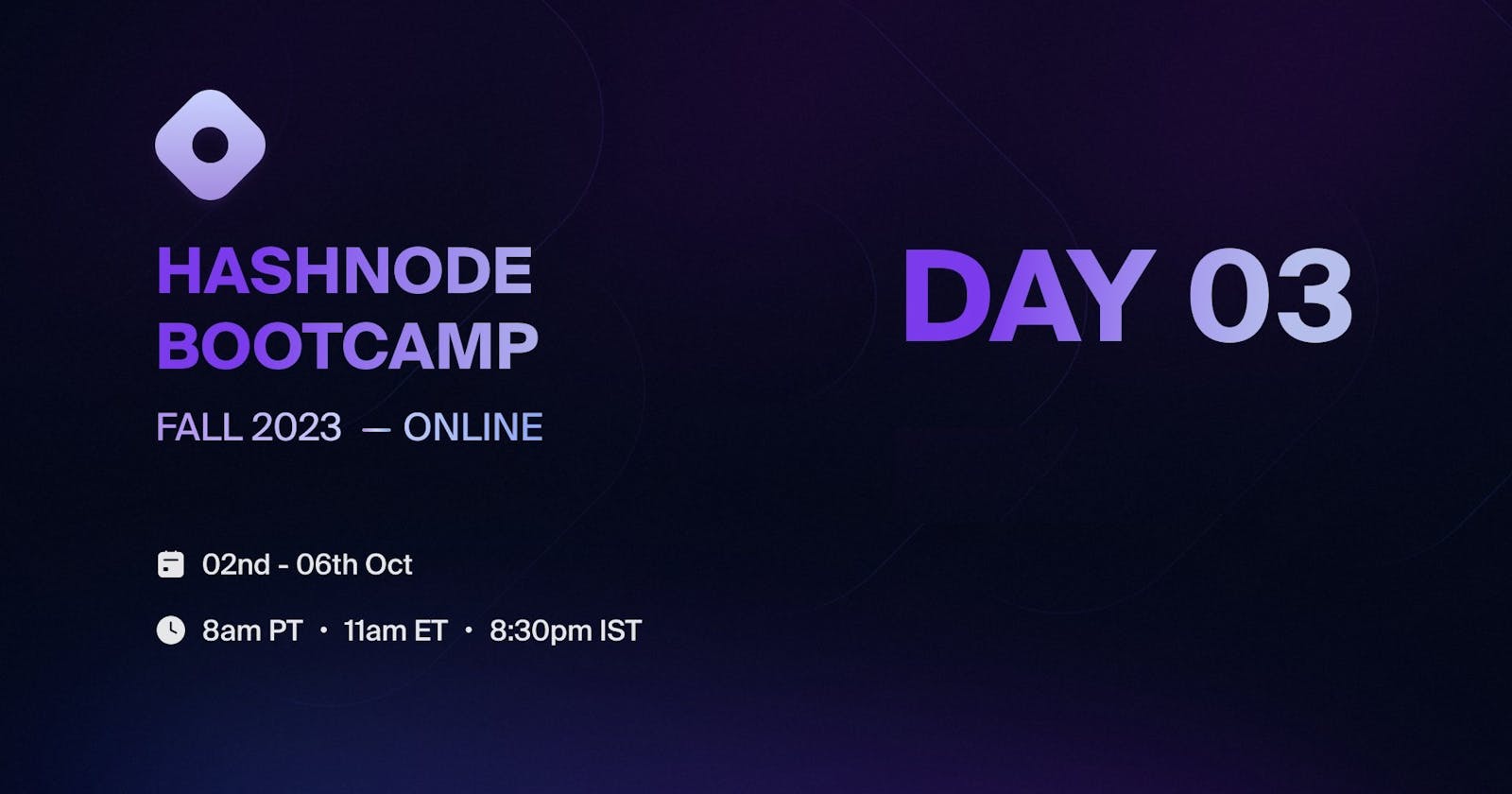Stepping into Day 3 of the Hashnode Bootcamp 2023 was an enlightening experience. The day was packed with experts' words of wisdom that inspired me. This article is a reflection of my key takeaways from the day, the lessons I learned, and how they have shaped my understanding of coding. So, let’s delve into my journey through Day 3 of the Bootcamp.
Today the Bootcamp hosted four engaging speakers today, each offering their own advice and insights. Kicking things off was Dan Eskow, who provided helpful tips for breaking into the tech industry, with a focus on web3 roles. He was followed by Brayden from Outerbase, who discussed strategies and best practices for developing a minimum-viable product (MVP). Next, the well-known YK of CS Dojo gave an inspiring talk about the value of building in public and contributing to open-source software (OSS). The final speaker was Haimantika from Appwrite, who offered guidance on sharpening technical writing skills. After hearing from each of these experts, the main takeaway that stood out was the importance of consistency—staying focused and persistent in working toward your goals.
Takeaways from Dan Eskow’s lecture:
Be original and unique when explaining why you applied for the job. Instead of using generic phrases like “I read the whitepaper, etc.”, provide reasons that brought you into the Web3 space.
Consistently engage in the space.
In a crypto company, not everything is about blockchain, so look for positions that interest you. What’s really important during the hiring process, apart from your skills, is being a great fit with the team and having a passion for the space.
Then he talked about how he helped people from different industries land jobs in the web3 space through his firm called Placement Labs.
Takeaway from Brayden Wilmoth's lecture:
Brayden from Outerbase talked about building an MVP.
Consistently communicate with your users and solicit their feedback. Without users, the quality of your product is irrelevant; it won’t endure.
Going from an idea to executing it is the hardest part. In this part, you have to be very consistent since, while executing, it may not be up to your expectations. But consistency is the key.
Case Study:
Theranos: Their idea was that with their machine, Edison, they could do 1000+ medical tests on a couple of drops of blood. As an idea, it is great, and really convenient for people who will become users in the future, but the problem is that that idea is greater than reality. In reality, their Edison machine could only run 12 tests so it did not take a long time for their valuation to go from $10 billion (at its peak) to 0.Learn: After getting feedback from your user, make sure you learn something instead of letting it sit to collect dust. Don't forget to communicate consistently with the users from whom you are collecting feedback. Also, don't turn a deaf ear to bad previews since they exist. Being in denial is always a short-term fix.
Takeaway from YK aka CS Dojo's lecture:
He talked about building in public and building your online presence. He talked about finding open-source projects to work on and how that can help with your online presence.
Take part in open-source projects to improve both your online presence and your skills and communication.
Do not be afraid to talk to people on social media platforms.
Try to provide as much value as you can to the community you are interested in.
Be consistent with your contributions, because karma is a beautiful thing when you do the right thing.
The most important thing after consistency is energy. You have to make sure you take care of both physical and mental health so that you have the energy to be consistent.
Takeaway from Haimantika Mitra's lecture:
Her lecture was about "The ABCs of technical writing".
Technical writing is the practice of conveying complex technical information in a clear, precise, and understandable manner.
Must-haves for technical writing are as follows:
Consistency: Maintain consistency in terminology, formatting, and style.
Visual aids: images, charts, or screenshots that can help clarify complex concepts
Clarity: Void complex language.
Conciseness: Get to the point and avoid unnecessary content.
Accuracy: Make sure all technical information is accurate and up-to-date.
Organization: Add a logical flow. Organize in a way that guides the reader effortlessly through the document.
Examples to learn from:
Next.js Docs: This is also my personal favorite. Vercel has set up a new bar for me on this.
Appwrite Docs: Maintains consistency and is developer-centric
MongoDB Docs: It uses the right amount of visuals and is very concise.
And that concludes my key learnings from Day 3 of the Hashnode Bootcamp 2023. It was a day full of valuable insights that I will cherish and apply as I continue on my coding journey. The main takeaway that resonated with me was the importance of consistency.
Whether it's staying persistent in pursuing career goals, gathering user feedback, contributing to open source, or writing technical documentation, consistency is key. Combined with passion and energy, it can take you a long way.
I'm grateful for the wisdom shared by all the speakers and motivated to put their advice into practice. The Bootcamp has been an enriching experience so far, and I look forward to gaining more knowledge in the remaining days.
Consistency, persistence, and learning from experts—this is the perfect formula to level up as a developer.
Happy Hacking !!!
